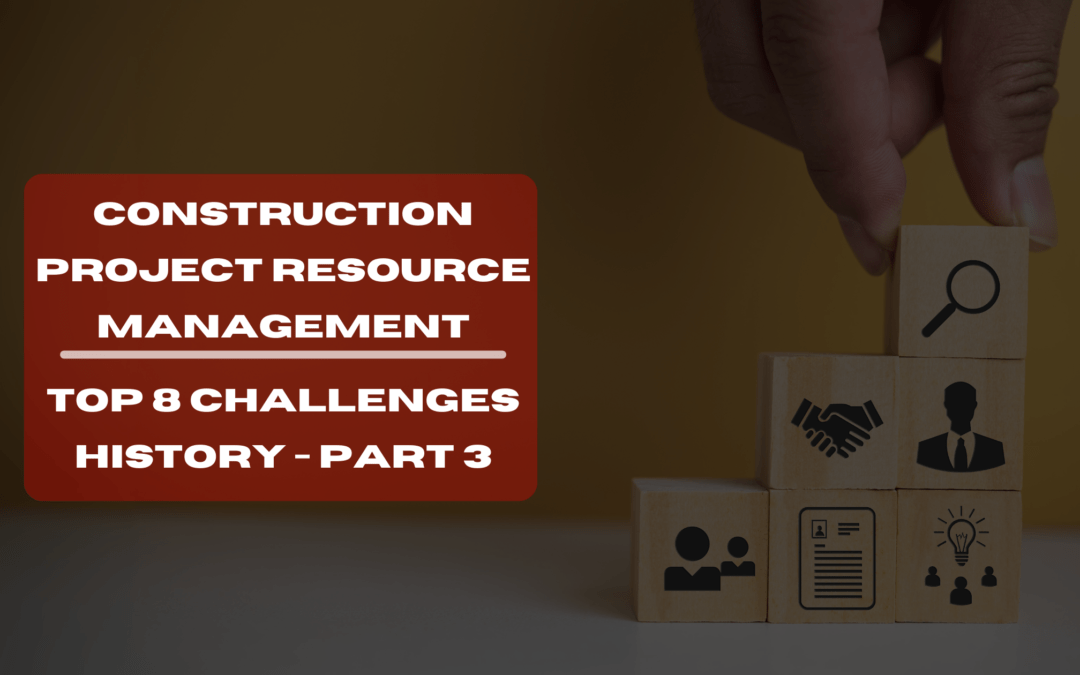Construction Project Resource Management Challenges: History Part 3
Effective Project Resource Management is essential in the construction industry to ensure projects are completed on time, within budget, and with the desired quality. However, managing resources in construction projects comes with its own set of unique challenges. In this article, we will explore these challenges in-depth, understanding how they impact project success and discussing strategies to overcome them.
If you want to refer to previous parts of this series, you can read them here:
Part 1: Unearthing the Origins of Construction Project Resource Management
Part 2: Construction Project Resource Management Principles and Methodologies
Table of Contents
1. Resource Allocation and Utilization
Challenge: Allocating the right resources to the right tasks at the right time is a complex puzzle in construction. Project managers must consider the availability, skills, and experience of their workforce, as well as the availability of materials and equipment. Misallocation can lead to delays, increased costs, and reduced project quality.
Solution: Adopt a comprehensive resource allocation strategy that takes into account not only the quantitative aspect of resources but also their suitability for specific tasks. Implement resource management software to track resource availability and utilization in real-time, enabling better decision-making.
2. Unforeseen Changes and Delays
Challenge: Construction projects are susceptible to unforeseen changes and delays due to factors like weather, unexpected site conditions, or regulatory issues. These disruptions can disrupt resource schedules and lead to resource shortages.
Solution: Develop a contingency plan that accounts for potential delays and disruptions. Maintain open communication with all stakeholders, allowing for quick adjustments in resource allocation when unexpected issues arise. Continuously monitor project progress and adjust resource schedules accordingly.
3. Skill Shortages and Workforce Dynamics
Challenge: The construction industry often faces skill shortages and fluctuating labor markets. Recruiting and retaining skilled workers can be a significant challenge. A shortage of skilled labor can lead to resource gaps and delays.
Solution: Build relationships with trade unions and educational institutions to access a reliable workforce pipeline. Invest in employee training and development to enhance skills within your team. Develop a contingency plan that includes cross-training to mitigate skill shortages.
4. Cost Control
Challenge: Cost control is a critical aspect of resource management. Over-allocating resources can lead to budget overruns, while under-allocating can result in inefficiencies and missed deadlines.
Solution: Implement cost control measures like Earned Value Management (EVM) to monitor resource costs and performance. Continuously track project expenses and ensure resource allocation aligns with the budget. Regularly review and adjust resource schedules to stay within budget.
5. Complex Regulations and Compliance
Challenge: Construction projects often involve complex regulatory requirements and compliance issues, such as environmental regulations, safety standards, and permitting processes. Failure to comply can lead to delays and resource reallocation.
Solution: Invest in compliance expertise and resources. Develop a thorough understanding of local regulations and codes. Integrate compliance considerations into resource management strategies from the outset to minimize disruptions and costly retrofits.
6. Communication and Collaboration
Challenge: Effective communication and collaboration among project stakeholders are essential for resource management. Miscommunication or lack of collaboration can lead to misunderstandings, disputes, and resource allocation conflicts.
Solution: Foster a culture of open and transparent communication within the project team. Use collaboration tools and software to streamline communication and ensure all stakeholders are on the same page regarding resource requirements and schedules.
7. Sustainability and Environmental Considerations
Challenge: The construction industry is increasingly focused on sustainability and environmental impact. Resource management must align with sustainability goals, which can be challenging when balancing economic and environmental interests.
Solution: Develop sustainable resource planning strategies that prioritize environmentally friendly practices while optimizing resource allocation. Consider using eco-friendly materials and energy-efficient equipment, and explore renewable energy sources for construction projects.
8. Technology Integration
Challenge: While technology can streamline resource management, adopting new technology and ensuring its integration into existing systems can be a challenge. Resistance to change and inadequate training can hinder technology adoption.
Solution: Invest in technology training and provide ongoing support to your team. Select technology solutions that align with your project’s needs and capabilities. Ensure seamless integration with existing systems to maximize efficiency and effectiveness.
Conclusion
Effective Project Resource Management in construction is vital for project success, but it comes with a myriad of challenges. By understanding and proactively addressing these challenges, construction project managers can optimize resource allocation, reduce risks, and enhance project outcomes. The construction industry continues to evolve, and resource management strategies must adapt to meet new challenges and opportunities.
In our next article, we will delve into different models and methodologies used to assess Construction Project Resource requirements and delivery, providing valuable insights into resource management practices. Stay tuned for more insights into this dynamic field.

